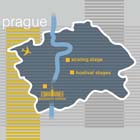Murky past troubles Czech politicians as elections near
 Prague - A murky post-communist past of privatization deals and influence peddling is catching up with Czech politicians of all stripes as election season nears. But will it have an impact?
Prague - A murky post-communist past of privatization deals and influence peddling is catching up with Czech politicians of all stripes as election season nears. But will it have an impact?
Late Thursday, a 55-year-old Prague hotelier fatally shot a 40-year-old businessman after what likely was a petty brawl at a posh downtown restaurant.
Remarkable enough in one of Europe's most charming capitals and a nation with little gun crime, the shooting reverberated because of its political connotation.
The main opposition leader had launched a book at the eatery just hours earlier. He is close friends with the victim's father, a man known as a post-communist deal-maker. Next week, Czechs will vote in regional and Senate elections.
"This incident had nothing to do with politics," Social Democratic opposition leader Jiri Paroubek rushed to say at a morning press conference.
Although Paroubek dissociated himself from the suspected killer, the incident highlighted a problem: Why does a former prime minister have acquaintances who carry loaded guns to public events?
Paroubek is hardly the only Czech politician whose past and present contacts are under scrutiny.
Czech newspaper Mlada Fronta Dnes recently published a series of articles based on leaked police wiretaps, which implicate prominent politicians, including Interior Minister Ivan Langer, in lobbying on behalf of a businessman involved in the privatization of a construction company.
The involved politicians said they did not know the man, murdered two years ago, was behind the deals they backed.
The mobster, Frantisek Mrazek, had boasted in a rare interview of having 23 politicians in his mobile phone directory. Czech media have dubbed him The Godfather.
Few politicians step down after such revelations. Langer, who received a private loan from a partner in the privatization deal he promoted, is still in his post.
Politicians also tend to think twice before seeking to link opponents with sleaze.
"They are afraid someone would pull out dirt on them," said political scientist Jiri Pehe, who heads New York University's Prague branch.
The shady ties from the wild post-communist years have haunted Czech politicians for years, often emerging in full force prior to elections.
"It discourages voters from going to the polls," Pehe said. "People say that voting does not make any sense because politics is dirty."
That could aid parties with disciplined voter bases such as the Communists or conservative Civic Democrats, he said.
Voters seem tired of the abundant scandals and are likely to cast a ballot in line with their political convictions.
"It is important for me that a politician does not lie and steal but all of them lie and steal," said 32-year-old secretary Eliska Jakubikova.
In the end, she plans to vote for the left because she wants "ordinary people to do better".
Voters like her are expected to issue a stern report card to the Prime Minister Mirek Topolanek's centre-right government, which has pushed through unpopular belt-tightening measures such as direct fees in health care.
Topolanek's governing Civic Democrats hold 41 seats in the 81-member Senate and govern 12 of the 13 regions where elections are scheduled Friday and Saturday.
Polls suggest that voters will likely do away with such overwhelming dominance. Analysts say that Topolanek's political fate now depends on the defeat's extent. (dpa)